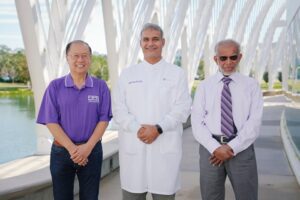Building on their continued global recognition, three Florida Polytechnic University professors have once again been named to an elite list of the top 2% of scientists in the world, highlighting their significant work in nanotechnology, critical rare earth element recovery, and electronics and electrical engineering.
Dr. Ajeet Kaushik, Dr. Muhammad Rashid, Dr. Patrick Zhang are esteemed authorities in their academic fields, continually advancing the world’s body of scientific knowledge through their consistent publications.
 Each has previously earned recognition on the prestigious list, celebrated for both their lifetime contributions and their recent research achievements over the past year.
Each has previously earned recognition on the prestigious list, celebrated for both their lifetime contributions and their recent research achievements over the past year.
The annual list compiled by Stanford University ranks researchers based on the number of articles published and the citations the articles receive, emphasizing the impact of their work rather than its volume.
“We are extraordinarily proud of these faculty members and their determination to stay on the bleeding edge of technological advancements in their fields,” said Dr. Devin Stephenson, Florida Poly’s president. “Our University’s commitment to excellence is reflected in their accomplishments, and I’m confident these remarkable professors will continue making great contributions to science while providing an exceptional education to their students.”
Dr. Patrick Zhang
As director of research at the University’s Florida Industrial and Phosphate Research Institute (FIPR), Zhang has elevated the nation’s understanding and capabilities in the recovery of critical rare earth elements (REEs) from phosphate and the wastes and byproducts of its mining.
“I feel honored and humbled. I really believe our research is having an impact nationally and internationally,” he said. “Recovering rare earths from phosphate plays an important part in the recovery of these critical materials from unconventional resources.”
The U.S. imports more than 80% of its REEs and critical minerals. Zhang’s research stands to transform that by creating new ways for robust domestic production of REEs, necessary for modern technology such as smartphones, wind turbines, solar panels and electric vehicles.
Dr. Ajeet Kaushik
Kaushik is an assistant professor of chemistry in the Department of Civil and Environmental Engineering. Kaushik’s research interests include sensors and biosensors, electrochemistry, and green and sustainable chemistry. He currently is exploring electrochemical sensors for health and environmental management.
“I’m making sensors that can do the job of detecting markers of concerns, which could indicate disease, infection, or environmental exposure,” Kaushik said. “My sensors are aligning with fifth- and sixth-generation sensing systems, so they’re small, smart, and can perform work wherever needed.”
Kaushik said his inclusion on the list of top scientists means greater opportunities become available to students who want to participate in high-level research, and to his peers as more disciplines are incorporated into his work.
Dr. Muhammad Rashid
Rashid is interim chair and professor in the Department of Electrical, Computer and Cybersecurity Engineering. He has long been regarded as a foremost expert in his field, writing seminal textbooks used by universities around the world. His two most recent books were published in 2024, and two others will be released in 2025.
“I try to work all the time; I want to share my ideas with people around the globe,” he said. “I have been fortunate to be able to do so much.”
Earlier this semester, Rashid was recognized as a Top Scholar by Scholar GPS, meaning he was in the top 0.5% of scholars worldwide. ScholarGPS is an online source for the analysis of scholarly activity.


